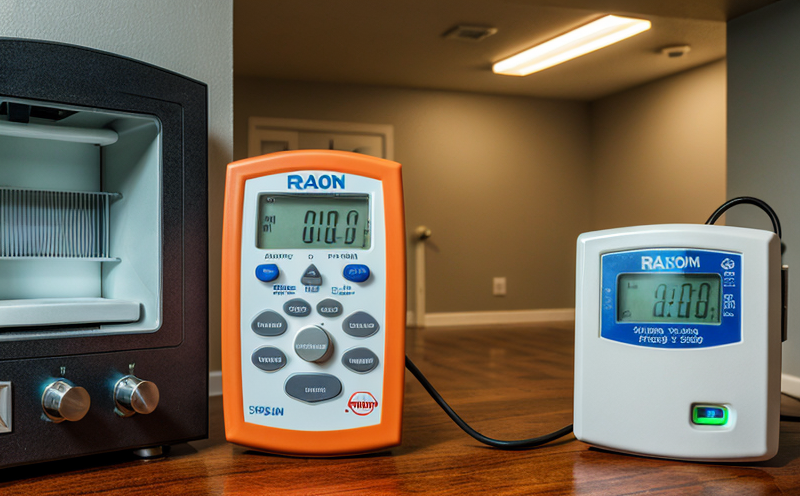ASTM E1165 Radiological Testing of Indoor Workplaces
The ASTM E1165 standard provides a framework for the measurement and assessment of indoor workplace exposure to gamma radiation. This service is essential for ensuring compliance with international standards, safeguarding employee health, and maintaining a safe work environment.
ASTM E1165 is widely recognized as a critical tool in identifying potential risks associated with radioactive materials present within enclosed spaces such as offices, laboratories, or industrial facilities. By adhering to this standard, organizations can demonstrate their commitment to occupational safety and environmental stewardship.
The testing process involves several key steps including site assessment, sampling strategy development, sample collection, analytical measurement, data interpretation, and reporting findings. Each step ensures accuracy and reliability throughout the entire evaluation procedure.
Site assessment begins by gathering detailed information about the layout of the indoor workplace, identifying sources of radiation, assessing ventilation systems, and understanding any historical use of radioactive materials. Based on this initial analysis, a tailored sampling strategy is created to ensure all relevant areas are covered comprehensively.
Sampling itself typically includes placing detectors at strategic locations around the premises for extended periods to capture accurate readings. These detectors can be either fixed or mobile units depending on specific needs and constraints. After collection, samples undergo rigorous laboratory analysis using sophisticated equipment capable of detecting minute levels of gamma radiation.
Data interpretation plays a crucial role in determining whether exposure levels exceed permissible limits set out by regulatory bodies like OSHA (Occupational Safety and Health Administration) or national equivalents. Results are then compiled into detailed reports that outline compliance status, suggest necessary corrective actions if needed, and provide recommendations for ongoing monitoring programs.
Compliance with ASTM E1165 helps organizations avoid costly fines, legal liabilities, and reputational damage while fostering trust among stakeholders including employees, customers, and regulatory authorities. It also enables proactive management of risks associated with occupational exposure to ionizing radiation, ultimately contributing to improved worker well-being and productivity.
For businesses operating in sectors where radiological hazards are prevalent, such as healthcare facilities or nuclear power plants, adherence to ASTM E1165 becomes even more critical. These environments often require stringent control measures due to higher risks of accidental contamination or overexposure incidents. By implementing robust testing protocols based on this standard, employers can ensure their operations meet both local and international safety standards.
Furthermore, compliance with ASTM E1165 enhances an organization's reputation as a leader in workplace safety practices. Demonstrating commitment to rigorous testing procedures shows that management prioritizes employee health above all else – which is increasingly becoming a differentiating factor in competitive markets. Additionally, it opens up opportunities for collaboration with other industry players who share similar values around occupational safety and radiation control.
In conclusion, ASTM E1165 radiological testing of indoor workplaces offers more than just peace of mind; it provides concrete evidence that your organization is committed to maintaining a safe environment free from undue risk. Whether you're managing a small office or overseeing large-scale industrial projects, this service ensures compliance with best practices while protecting both personnel and the surrounding community.
- Data integrity: Ensures accurate measurement and interpretation of radiation levels
- Regulatory adherence: Meets international standards for workplace safety
- Risk mitigation: Identifies potential hazards before they become critical issues
- Employee confidence: Provides reassurance regarding occupational health and safety measures
- Compliance verification: Documents ongoing efforts to maintain regulatory compliance
- Promotional tool: Highlights your organization's commitment to excellence in workplace practices
Why It Matters
Understanding the importance of ASTM E1165 radiological testing extends beyond mere legal requirements. In many industries, exposure to ionizing radiation can have severe health implications ranging from short-term skin burns to long-term cancers if not properly managed.
For instance, healthcare facilities dealing with radioactive isotopes used in diagnostic imaging or therapeutic treatments must ensure minimal leakage into surrounding areas where patients and staff could be exposed. Similarly, nuclear power plants need continuous monitoring to prevent accidental releases that might affect nearby communities.
The implications of non-compliance can be far-reaching. Penalties imposed by regulatory agencies may lead to significant financial losses for affected entities. Moreover, negative publicity resulting from incidents involving radioactive contamination can severely damage public trust and investor confidence.
On a broader scale, ensuring compliance with ASTM E1165 contributes positively towards global efforts aimed at reducing the overall burden of radiation-induced illnesses worldwide. By setting high standards for indoor workplace testing, this standard plays a vital role in promoting safer working conditions globally.





